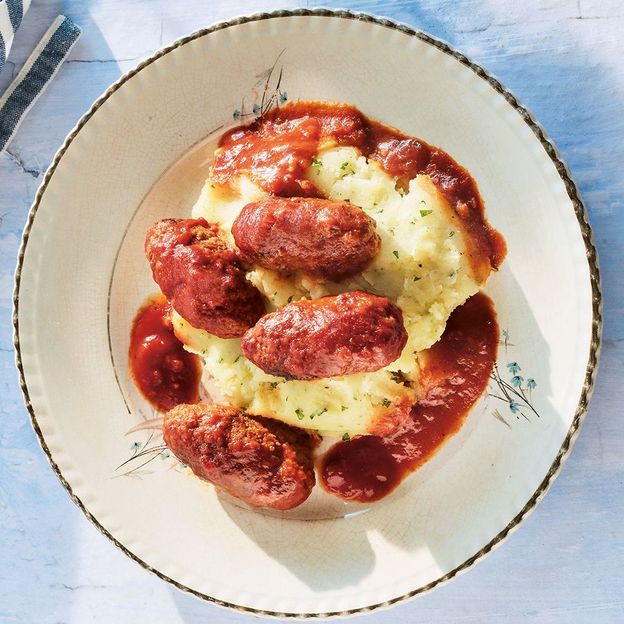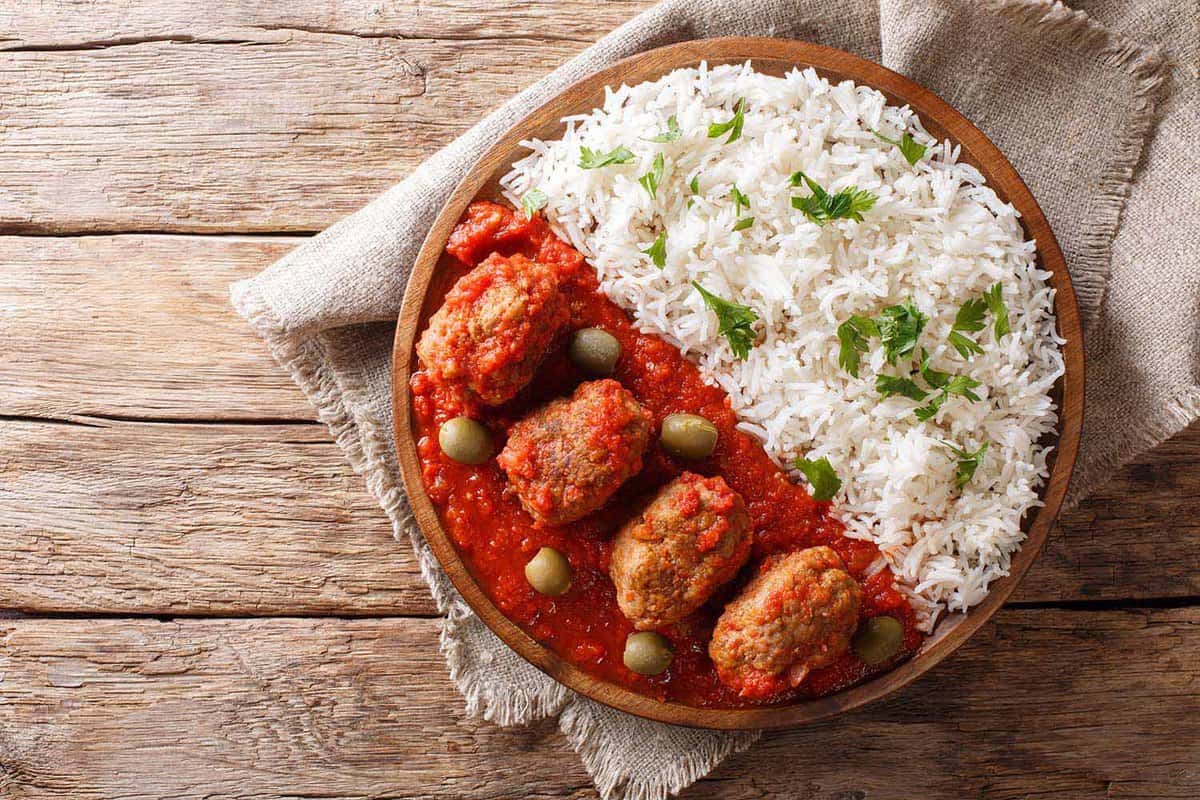More than just a plain meatball, soutzoukakia are undeniably rich and comforting, laced with hints of red wine, cumin and garlic and swathed in a hearty tomato sauce.
in and garlic and swathed in a hearty tomato sauce.
Soutzoukakia are more than their literal translation: meatballs. They are undeniably rich and comforting, laced with hints of red wine, cumin and garlic and swathed in a hearty tomato sauce. It’s a dish packed with flavour as well as history. The origins of soutzoukakia trace back to the Greek population of the early 20th Century Empire. This is a dish that was created by a minority population and survived atrocities, thanks to the hundreds of thousands of survivors who carried the recipe with them from Turkey to Greece.
Carolina Doriti, brings its history and recipe together in her new cookbook, Salt of the Earth: Secrets and Stories from a Greek Kitchen (March 2023). Born-and-raised in Athens, Doriti has spent most of her life in the Greek capital. She started cooking at a young age, with food playing an integral part in her life. She began cooking professionally in 2005 and has since worked as a private chef, recipe developer, food journalist and restaurant consultant. She’s also the culinary producer of the celebrated Greek American chef, Diane Kochilas’ PBS program, My Greek Table.
Although she’s spent plenty of time behind the scenes, Doriti’s cooking is front and centre in Salt of the Earth. As the title hints, the book is an expression of Greek kitchens, their history and Doriti’s extensive travels across the country.
Greek cuisine, she explained, doesn’t rely on difficult cooking methods or expensive ingredients. Rather, the emphasis is on high-quality produce, seasonal vegetables, and regional ingredients, like olive oil. The modern concept of “zero waste” has always been fundamental to Greek cuisine, long before it became a fashionable trend.
“This is the true essence of this cuisine, historically,” she said. “You had to make the most use of what you had at hand. Preservation and creative use of every part of an animal or plant […] really define Greece and its cuisine.”
Salt of the Earth offers up a more nuanced, complex look at Greek cuisine than what you can typically find abroad, where the focus is often placed on just a handful of dishes, like moussaka and souvlaki. Among recipes for lesser-known dishes like tsouchti (pasta with cheese and egg) and revithada (clay pot-based chickpeas) is Doriti’s soutzoukakia.
Caroline Doriti’s new cookbook shares the story behind this Greek comfort food
The first soutzoukakia originated in Smyrna, or what is now Izmir, Turkey. The name itself derives from the Turkish word sucuk (a spicy, fermented sausage made from ground meat). The mass killing of Greeks by the Ottoman Empire during and just after World War One forced the Greek Ottoman Christian population to flee parts of Turkey, especially Anatolia. Those who made it safely to Greece brought the recipe along with them. Among the survivors was Doriti’s grandmother. Soutzoukakia, as such, has significant meaning for her.
“The Greeks of Anatolia (Asia Minor in modern Turkey) and particularly Smyrna (Izmir) created this recipe, turning the sucuk into wine-based meatballs served in a tomato sauce,” she wrote in her book. “They kept the oblong shape of the sucuk, ditching the intestinal tissue and adding red wine to the mix, along with a luscious tomato sauce that often has the addition of butter for extra richness and velvety texture.”
“The use of red wine is a vital and distinct element of the flavour of these meatballs. They are usually fried first, then added into the tomato sauce,” Doriti wrote. “Some cooks, including my mother (who inherited this recipe from her grandmother), bake them along with potatoes and sliced tomatoes. But I must confess my preference is for the stovetop version with the sauce.”
Doriti explained that Greek recipes are often distinguished by the use of wine in cooking, like in the case of soutzoukakia. “This is mostly how they ‘Christianised’ dishes,” she said. Recipes featuring wine as well as tomatoes have a Greek origin story because wine is not used in Muslim cooking, and tomatoes were incorporated into Turkish cuisine later in the 20th Century.
These days the original recipe left behind by the Greek refugees of Smyrna survives in Turkey by the name of izmir köfte. Doriti writes that the dish is similar, but excludes the wine, uses significantly less tomato, and it is baked in the oven along with sliced potatoes and green peppers.
Doriti is hoping her book will keep recipes like soutzoukakia at the forefront of Greek cooking and will inspire people to look beyond the more common dishes. “This is a book I’ve been researching for a long time,” she said. “I’ve travelled everywhere in Greece, and I’ve really researched a lot. Not just local produce, but also the very traditional old things that almost are lost.”
When making soutzoukakia, Doriti says you can either bake or fry the meatballs. But she does recommend using a sweet wine, like Mavrodaphne or red Vin Santo from Santorini. This, she said, gives it the right flavour.
Caroline Doriti’s soutzoukakia are laced with hints of red wine, cumin and garlic and swathed in a hearty tomato sauce
Soutzoukakia: Meatballs with red wine
By Carolina Doriti
(serves 4-6)
Ingredients
For the meatballs
130g stale bread (no crust)
300ml red Vin Santo or Mavrodaphne wine
700g ground beef (shoulder/chuck and blade if possible)
1 large egg
4-5 garlic cloves, minced
1 rounded tsp ground cumin
2 tbsp olive oil
2 tsp salt
1 tsp freshly ground black pepper
sunflower oil, for frying
mashed or fried potatoes or rice, to serve
For the tomato sauce
1 tbsp olive oil
1 large garlic clove, finely chopped
2 bay leaves
1 tbsp tomato paste
2 tsp grape or fig molasses
120ml red Vin Santo or Mavrodaphne wine
900g fresh, ripe tomatoes, skinned and pulsed or grated (or use chopped canned tomatoes)
1 tsp ground oregano
1 tsp parsley, chopped
salt and freshly ground black pepper
Method
Step 1
Put the bread in a bowl, pour the wine over it and soak for 10-15 minutes.
Step 2
Strain the bread (keeping the wine) and shred it with your fingers.
Step 3
In a large bowl, combine the ground beef, egg, garlic, cumin, shredded bread with any soaking wine, olive oil, salt and pepper. Knead thoroughly, cover and chill for about 1 hour.
Step 4
Shape the mixture into about 30 small oblong meatballs and set aside.
Step 5
In a frying pan, heat enough sunflower oil for frying. Cook your meatballs for 2-3 minutes each side, until golden brown, then place on kitchen paper to drain.
Step 6
For the tomato sauce, heat the olive oil in a large saucepan. Add the garlic and bay leaves and sauté for 1 minute. Next add the tomato paste and molasses and stir. Follow with the wine, then add the grated tomatoes with all their juices and stir again. If the sauce is too dry, add a bit of water, but no more than half a wine glass. Simmer for about 15 minutes before adding the meatballs and oregano and continuing to simmer for another 10-15 minutes.
Step 7
Add most of the parsley to the sauce and remove the bay leaves. Serve the meatballs with mashed or fried potatoes, or with rice. Sprinkle with the remaining parsley and freshly ground black pepper.
BBC.com’s World’s Table “smashes the kitchen ceiling” by changing the way the world thinks about food, through the past, present and future.
Source : BBC



